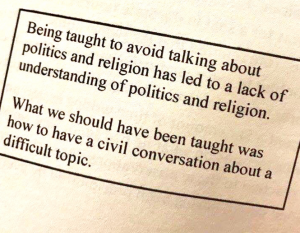Last week, I ended What I’ve Learned From the WordPress Wars with the question, “Why can’t we talk dispassionately when we disagree?”

Today, we’ll take a look at my theory, in two parts (two and a half, actually).
1. Let’s start with our brain.
In a post I did in 2016 (Blame It On the Oxytocin), I introduced some of you to the “anterior cingulate cortex” (ACC) — the seat of our emotional reactions. I’ve learned a bit more since then and, as a result, we can now go deeper. Deep breath.
What we really need to appreciate is the amygdala, a tiny almond-shaped lump that is part of the more ancient portion of our brain that functioned back when Og (the farmer) and Pong (the hunter) were waring over turf. Our basic emotions, the ones that deal with survival — flight, fight, or freeze — are processed in that ancient, primitive, part of our brain: the amygdala. It’s a bit scary when you think about it. Dangerous even.
But don’t be discouraged. We’ve come a long way since Og and Pong roamed the reeds. These days we also have a prefrontal cortex where poetry, music, art, and language are born; where cognition is formed, and where reason resides. We have the capacity to be more than our reactions. We have the ability to be thoughtful.
But do we? It’s sometimes not as easy as it sounds.
So, the first part of my theory involves the primitive vs. the evolved brain: the cerebellum vs. the cerebrum. It’s time now for the second part of my theory on why we don’t just get along.
2. (a) Our need for community, for knowing where we belong, is powerful. And validation reminds us we’re where we belong.
When you believe as I do, whatever cockamammy idea I’ve presented, my belief is validated. And if my belief is right, I am right; I am validated. Yay me; let the oxytocin flow. (a not so subtle reference to that blog post Blame It On the Oxytocin)
When ten people believe as I do, it’s even better. But, if you — and those others — believe something different, if I am not validated, then perhaps I’m wrong. But more easy to believe: you must be wrong. And to be wrong is dangerous when the cerebellum (seat of that little, ancient amygdala) is calling the shots.
Think about it. Our ancestors, Pong and Og, had to be able to tell friend from foe. The quicker one was able to identify that foe, the longer they lived, and they reproduced. That’s sort of an evolution 101 in CliffNotes form.
Here’s another way to look at it. The story is as old as time.The Jets and the Sharks (a la West Side Story) were just a modernized version of the Montagues and the Capulets. And then we have the Old Testament — filled with such conflicts.
Not so long ago, we’ve had Nazi Germany and the Hutus vs. the Tutsis. Today, it’s the Syrian Government vs. the Rebels, the Palestinians vs. the Israelis, Iraqis vs. Kurds. That humans can be devastatingly inhumane is not new.
In our own backyard, we’ve got conservatives and liberals, political activists and apolitical citizens, and the list goes on: vaccinations, GMOs, gun control, abortion, tax relief, the list of topics that divide us goes on.
For me, when the question is only who is right and who is wrong, we get nowhere.

From where does this compulsion to prove we are “right” come from?
2. (b) Our need to be “right,” to be validated, is our automatic default mode.
Being right is valued in our culture and has been the foundation of our educational system. Think about it. “Right” answers get rewarded in school; “wrong” answers get sanctioned. It’s the rare teacher who knows how to welcome and reward the well-asked and creative question.
We’re bombarded with “rightness.” TV news is replete with mindless pingpong games of “I’m right; you’re wrong” talking heads. As though it really matters any more.
Being “right” affirms our self-worth; it validates us. It reminds us we belong. And it assures us we are not wrong.
Why is being “wrong” so painful? Why is being uncertain so difficult? Why does ambiguity throw us for a loop? I’m guessing that’s our cerebellum in charge.
If we allow a bit of cerebrum to intrude, we might just discover the joy of learning for learning’s sake, the freedom to sit in uncertainty because it allows the unexpected. And it may help us grow.
My need to change someone’s mind is a valiant attempt by my primitive amygdala to protect me, plus my need to know where I belong and the result of the programming I got growing up that being right was vital to my success.
For the past twenty years, I’ve turned to a mantra that has helped.
I’d rather be happy than right.
In 1992, during the Los Angeles riots that erupted following the acquittal of the four policemen whose beating of Rodney King was videotaped and shown across the country, King, famously asked, “Can’t we all just get along?” I think we’re getting pretty close to an answer.
How about you? Today I’ll let you ask the questions.
P.S. Since writing this post, I’ve come across this interview on Krista Tippet’s On Being, which speaks to the same idea, but in more poetically hopeful terms.
https://onbeing.org/programs/arlie-hochschild-the-deep-stories-of-our-time-oct2018/
Clive
Sadly, I think that we have always had disagreement to the point of conflict. It may be negative of me, but I don’t see that changing any time soon. There are some powerful vested interests who see life as a battle to be won, for whom ‘getting along’ doesn’t appear to be part of their value set.
Clive recently posted…#TimeToTalk Day 2019
Janet Givens
I’m hoping this post helps us all to recognize when we fall into that “I gotta be right” mind set, Clive. And yes, it’s hard to watch others make a mess of things and know there’s nothing we can do to change them. If God had only worked one more day, perhaps he could have fixed that oversight. Wouldn’t it be nice to have the power to change other people? Alas …. Thank you for starting us off.
Wouldn’t it be nice to have the power to change other people? Alas …. Thank you for starting us off.
Janet Givens recently posted…My Amygdala Makes Me Do It: The WP Wars, Part II
Laurie Buchanan
Janet — “I’d rather be happy than right” is a wonderfully powerful mantra to embrace.
Laurie Buchanan recently posted…Mystery Writers Academy
Janet Givens
It is indeed, Laurie. Though, I have on occasion found it easier to adopt when the “other” person also adopts it. Thanks for joining in. It was a rather dense post, I realize. I may have lost some regulars.
Tim Fearnside
I think you’re correct that our biology contributes significantly to our need to be “right,” and our reactions to disagreements. I also believe that we can rise above hostility and learn to handle our disagreements more civilly. What saddens me is having watched our collective civil discourse decline dramatically over the past 30+ years, as well as our reliance on actual facts in advancing our positions (to the point where they are now virtually irrelevant). It seems evident to me that this has been largely by design, and that certain interests benefit considerably by division and “otherization,” for they depend on scapegoating and a population divided. (Hence, the culture wars). I didn’t realize the ’80’s, however flawed, were something of a golden age, until I watched demagoguery replace civility and bipartisanship altogether in favor of the interests of a small few. I hope more than anything we can somehow stem this tide.
Janet Givens
Funny, our definitions of “golden age.” Mine was the ’50s; back when I lived in and despised the ’80s. And now, I look back so fondly at the ’60s, even though it was a time of great contention. It was also a time of great activism and engagement. I guess each age brings its pros and cons.
I concur on the difficulty of civil discourse, though. Perhaps it’s time to do away with that old adage about refraining from discussing politics (and religion and sex and money — were there others?) in polite society. We’ve all forgotten how to do it! And debate club! Remember those? I was never in one, but I do understand how powerful they can be, teaching a person how to put themselves in the opposition’s shoes. I do believe, as I write this now, that I’ll try and get my local LWV to sponsor a debate club in the local schools. How about in your kids’ school, Tim? Do they have a debate club?
Janet Givens recently posted…My Amygdala Makes Me Do It: The WP Wars, Part II
Tim Fearnside
My girls’ school, which runs from pre-k through 9th, doesn’t have a debate team or club, although debate is built into the curriculum beginning in 7th grade (7-9). So, my oldest (who is in 9th), has maybe 3 or 4 per year, typically with a partner, and they take on some weighty stuff, which is good.
Janet Givens
Thanks Tim. I hope they enjoy it, or at least appreciate the value.
Janet Givens recently posted…My Amygdala Makes Me Do It: The WP Wars, Part II
Ally Bean
I, too, use the right or happy mantra on an almost daily basis. It’s a way of navigating life smoothly, trying to lead by example rather than by hard words. Too many people I know are programmed with the idea that anything different is worth fighting against. I often say to myself: you can’t have a tug of war if no one is holding onto the other end of the rope.
Janet Givens
Hi Ally. I love your tug of war analogy. Thanks.
Janet Givens recently posted…My Amygdala Makes Me Do It: The WP Wars, Part II